Elections 2013: What it means leader by leader
- Published
A clear picture has emerged from the 2013 elections, showing the UK Independence Party making big gains. What do the results mean for the party leaders?
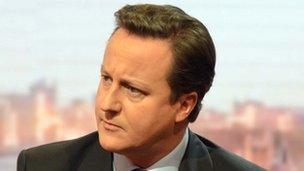
Conservatives - David Cameron
David Cameron will be pondering what the implications of this election could be for internal party discipline: could UKIP's march forward see the battalions of Eurosceptic Tory MPs make life awkward for the prime minister?
One thing is already very clear: the strategy based on insulting UKIP is over. No longer are senior Conservatives branding them "loonies, fruitcakes and closet racists" or "clowns".
"It is no good insulting a political party that people have chosen to vote for," the prime minister said.
The question Conservative MPs will be asking their leader is this: if UKIP keeps on making this kind of progress, could it fatally wound any chance of the Tories winning an overall majority at the general election in 2015? Yes, UKIP has taken votes from all the main parties at Westminster. But it appears to be inflicting disproportionate wounds on the Tories.
Conservative MPs will fret that a split of the vote on the Right could not just cost them their seats, but allow Labour to sneak through the middle and win the next election. The prime minister has promised a referendum on the UK's membership of the European Union if the Conservatives win in 2015. Put that to Nigel Farage, the UKIP leader, and he smiles. "But are they really going to win that election?" he asks.
Labour - Ed Miliband
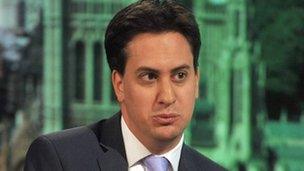
Ed Miliband's party won the parliamentary by election in South Shields and took the mayoralty of North Tyneside from the Conservatives. But these two victories were "must wins": anything else would have been a disaster for the party.
Labour's progress overall was modest for a party that aspires to win a general election in just two years' time. In short, the party has failed to perform as well in attracting real votes as their national opinion poll ratings would have suggested.
This is the first time that none of the three main Westminster parties has performed well enough to suggest that they would win at least 30% of the vote if there had been local elections across the country.
Labour's Projected National Share, at 29%, will unnerve those Labour MPs who have never quite shaken off a fear that Ed Miliband doesn't quite have what it takes.
Liberal Democrats - Nick Clegg
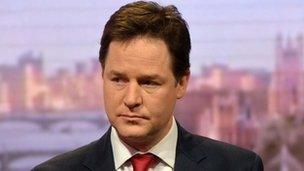
The big question for the Lib Dems remains: will going into coalition with the Conservatives end up being a fatal embrace? The evidence from the by-election in South Shields certainly isn't encouraging for Nick Clegg. The party finished seventh, a mere 155 votes ahead of Howling Laud Hope from the Official Monster Raving Loony Party. Ouch.
A party source did his best to give the night a positive spin: "The indications we're getting so far show the Lib Dems remain strong in our held parliamentary seats, which is what matters for 2015. Our focus for 2015 is to do well where it matters most - in seats we can actually win." In other words, the Lib Dems will be ruthless in two years' time and circle the wagons around those seats they believe they can cling on to. The clear implication is others will be left to perish alone.
One other line from that Lib Dem source that is worth a thought. This plan, they hope, is "the path back to power for the Liberal Democrats". That's what the party has its eye on: a hung parliament after 2015, with either the Tories or Labour as the biggest party, and the Lib Dems back in government again.
United Kingdom Independence Party - Nigel Farage
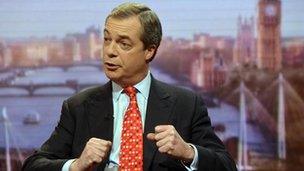
It has been a huge set of results for UKIP and for party leader Nigel Farage. But in the blur of excited analysis, it's worth remembering this is still a party that doesn't control a single big local authority or have a single MP at Westminster. At least not yet. But that said, UKIP is now definitively an outfit the "big three" parties at Westminster can't dismiss.
For Nigel Farage, these results will give him a profile on the national stage bigger than ever, but a big challenge too. The party's public profile has now overtaken its behind the scenes operation. Mr Farage is the party leader, forever dashing between the UK, Brussels and Strasbourg and now has to oversee building an internal party infrastructure that can cope with its new scale and the scrutiny that will come with it.
The next big challenge will be clearing the next big hurdle UKIP has set for itself: winning the European elections in 2014.
Then the focus will switch to the general election in 2015, which Nigel Farage admits will be very tough: the first-past-the-post system at Westminster makes it very hard for small parties to break through.
Green Party of England and Wales - Natalie Bennett
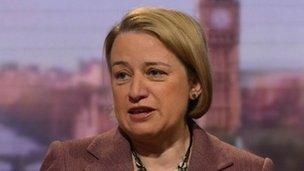
In the battle for attention amongst the minor parties, there is no doubt Nigel Farage of UKIP easily outgunned the new leader of the Green Party in England and Wales, Natalie Bennett. But consider their relative starting points in local government.
Before these elections, the Green Party held 134 council seats across England and Wales. In other words, far, far more than UKIP. In Natalie Bennett's first big electoral test as leader, the Greens haven't made a huge leap forward, with a net gain of just five seats. One striking result came in Warwickshire, where the Conservative leader of the county council lost his seat to the Greens.
The Green Party acknowledge that UKIP has "touched a nerve" with voters, but some in the party are irritated that an outfit like UKIP, with what they see as simple but implausible ideas, is attracting so much attention and support.
While they have lost their place as the fourth biggest party in local government in England, the Greens can take comfort in some encouraging results of their own.